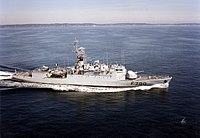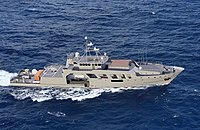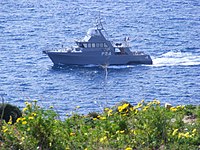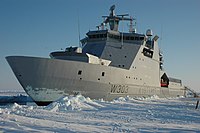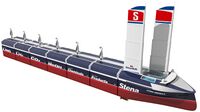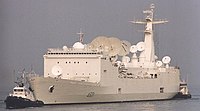Navy of Burgundie
| Navy of Burgundie | |
|---|---|
| Armada della Republique Real Burgundie | |
 Typical Navy of Burgundie taskforce | |
| Country | |
| Type | Navy |
| Role | Naval warfare, power projection, Humanitarian aid/intervention, Coastal defense, maritime law enforcement, search and rescue, and sealift |
| Size |
|
| Part of | Burgoignesc Security Forces |
| Motto(s) | Burg's Big Stick |
| Colors | Royal Red, Burgoignesc Blue |
| Engagements | all of them, (Levantine Creep) |
| Insignia | |
| Ensign |  |
| Emblem |  |
| Insignia | Ranks in the Burgoignesc Security Forces |
The Navy of Burgundie is a maritime branch of the Burgoignesc Security Forces. Founded in the 17th century, the Navy of Burgundie is one of the oldest navies still in continual service, with precursors dating back to the Middle Ages. It has taken part in key events in Military history of Burgundie and played a critical role in establishing and securing the Burgoignesc Colonial Empire for over 400 years. The Navy of Burgundie pioneered several innovations in naval technology including:
- the naval ram;
- military clipper ships;
- barbettes;
- Jeune Ecole strategy/torpedostorpedo boats;
- VLS;
- containerization;
- radar;
- sonar;
- LORAN; and
- pandemic-level "proliferation" of Bergendii genetic material. It is said that up to 1/5th of the world's coastal population is the progeny of the Navy and Merchant Marine of Burgundie.
Mission
The mission of the Navy of Burgundie is to maintain, train and equip combat-ready maritime and littoral combat forces capable of winning wars, deterring aggression, and guaranteeing the freedom and safety of Burgoignesc sovereignty, its waterways, and Freedom of the seas.
The Navy's five primary areas of responsibility are:
- The preparation of naval/coastal defense forces necessary for the effective prosecution of a war.
- The maintenance of naval aviation, including land-based naval aviation, air transport essential for naval operations, and all air weapons and air techniques involved in the operations and activities of the Navy.
- The development of aircraft, weapons, tactics, technique, organization, and equipment of naval combat and service elements.
- The provision of logistical, human, and material support to Humanitarian aid/intervention efforts taken in conjunction with or on behalf of the international community.
- The enforcement of Burgoignesc Maritime Prefecture Law and internationally recognized elements of maritime law.
Traditions
The Navy of Burgundie has a strong connection to Istroya throughout its history. Many of its traditions stem from this connection, especially its naming conventions and its rank titles.
History
The historical navies of Istroya, coastal Dericania, and Burgundie have been running amok for thousands of years in the waters of modern Burgundie.
The history of naval doctrine in Burgundie is no
Age of Discovery
Age of Sail
Line Ahead, Crossing the T, speed over firepower, only engage Kiravian ships when they are beating hard into their close haul
Age of Steam
late 19th-early 20th century:
Young School- The Jeune École ("Young School") was a strategic naval concept developed during the 19th century. It advocated the use of small, powerfully equipped units to combat a larger battleship fleet, and commerce raiders capable of ending the trade of the rival nation. The idea was developed among Burgundian naval theorists: the Burgundian government had one of the largest navies of the time, and the theorists desired to counteract the strength of the Kiravian Navy which was the largest.
Countre-Jeune École- Caphiria utilized the Jeune École against the Urcean Royal Navy and the Navy of Burgundie during the First Fratricide, Red Intereggnum and the Second Fratricide. This spurred the development of coastal defense ships and guard ships not only in Burgundie but also other southern Levantine countries.
Age of Battleships

-20th century-Burgundie was a late adopter of the tenents of the Age of Steel.
Missile Age
In the conduct of littoral/amphibious combat Burgundie has distinguished itself as a brutal adversary. Starting in the second half of Operation Kipling the Navy began a policy of unrelenting resource extraction along the coast of adversarial nations. Flotillas of trawlers we're assembled to feed the soldiers, sailors, and Marines leading to those serving in eastern Alshar to get the moniker "Mukbang Marines". This later expanded to littoral mineral and Petro carbon exploration/mining efforts as well. This all led to the Navy defraying about 28-34% of the war costs by the last two years of the war.
Metaorizonal Age
-21st century- Command of the sea The Metaorizonal Age in Burgoignesc naval doctrine started with the advent of microprocessors become prevalent enough to be used in missiles that allowed beyond the horizon metaorizonal targeting but is pegged specifically to the implementation of vertical launch systems (VLS) on surface combatants in 1985. While other navies quickly adopted this technology, Burgundie embarked on a grand scheme to retrofit almost all of it's larger surface combatants with VLS systems in the 90s through 2010s. This provided incredible metaorizonal capabilities to the entire navy but as soon as it was completed it was obvious that the ships were starting to age out and newer ships were required.
An entire industry shift away from building new ships and towards retrofitting older ships had occurred in the military shipyards of Burgundie over 25 years and a generational gap in military ship building knowledge had formed.
21st Century Burgoignesc Power Projection Stratagem
- Over-the-beach capability
- Seabasing
- Command of the sea
- Mitigating Loss of Strength Gradient/increasing Sealift capabilities
Organization
 Secretary of the Navy
Secretary of the Navy
- Admiralcy of the Fleet
- Admiralcy of Maritime Operations
- Rear Admiralcy of Naval Aviation
- Vice Admiralcy of Special Naval Services
- Admiralcy of Ancillary and Support Services
- Vice Admiralcy of Training and Education
- Admiralcy of the Fleet
Vandarch Sea Guard
- Vandarch Sea Guard
 Destroyer Squadron Vandarch Shield
Destroyer Squadron Vandarch Shield
- 1 Destroyer
- 1 AAW frigate
- 1 Corvette
 2 cutters of the Revenue Guard
2 cutters of the Revenue Guard- Replenishment oiler
- Auxiliary ship
Levantine Ocean Command
LevCom Admiral's Administrative Department
- Area of operations: Levantine Ocean
- 1st Fleet
- Rapid Deployment Group 7 Burg: Groupement Disembarkement Rapide no. 7
- Expeditionary Strike Group Levantia Reach
- Sustainment Division Cornucopia
- 2nd Fleet
- Combined Arms Squadron Meridian
- Sustainment Division Medimeria
- Littoral Defense Forces/Stone Carriers
- Patrol Vessels/Avisos as assigned
Metropolitan Defense Command
MetCom Admiral's Administrative Department
- Area of operations: Sea of Istroya, Sea of Canete
- 3rd Fleet
- Combined Arms Squadron Istroyan Shield
- Combined Arms Squadron Julian Gauntlet
- Littoral Defense Forces/Stone Carriers
- Patrol Vessels/Avisos as assigned
Odoneru-Ostecian Central Command
Odo-OstCom Admiral's Administrative Department
- Area of operations: Odoneru Ocean, Tainean Sea, St. Brendan's Strait, Albion Sea, Songun Sea
- 4th Fleet
- Rapid Deployment Group 3 Burg: Groupement Disembarkement Rapide no. 3
- Expeditionary Strike Group Tainean Fury
- 5th Fleet
- Rapid Deployment Group 5 Burg: Groupement Disembarkement Rapide no. 5
- Expeditionary Strike Group Typhoon Thunder
- 6th Fleet
- Combined Arms Squadron Odoneru Constellation
- Sustainment Division St. Brendan
- Littoral Defense Forces/Stone Carriers
- Patrol Vessels/Avisos as assigned
Absurian Command
AbsCom Admiral's Administrative Department
- Area of operations: Absurian Ocean, Founders Sea, Pukhtun Sea
- 7th Fleet
- Rapid Deployment Group 2 Burg: Groupement Disembarkement Rapide no. 2
- Expeditionary Strike Group Whipping Wind
- Sustainment Division Eternal Night
- Combined Arms Strike Squadron Australis
- Littoral Defense Forces/Stone Carriers
- Patrol Vessels/Avisos as assigned
Grand Ularien Command
GranCom Orientale Admiral's Administrative Department
- Area of operations: Barbary Straits, Middle seas region, Bay of Oduniyyee, Nassarine Bay
- 8th Fleet
- Rapid Deployment Group 1 Burg: Groupement Disembarkement Rapide no. 1
- Expeditionary Strike Group Kandahar Resolve
- Combined Arms Strike Division Riptide
- Sustainment Group Ever Present
- 9th Fleet
- Rapid Deployment Group 4 Burg: Groupement Disembarkement Rapide no. 4
- Expeditionary Strike Group Cathay Reach
- Combined Arms Strike Division Stiletto
- Sustainment Group Ever More
- Littoral Defense Forces/Stone Carriers
- Patrol Vessels/Avisos as assigned
Boreal Command
BoCom Admiral's Administrative Department
- Area of operations: Sea of Nordska, Kilikas Sea
- 10th Fleet
- Rapid Deployment Group 8Burg: Groupement Disembarkement Rapide no. 8
- Combined Arms Strike Group Sudden Storm
- Littoral Defense Forces/Stone Carriers
- Patrol Vessels/Avisos as assigned
Polynesian-Okatian Command
Po-OkCom Admiral's Administrative Department
- Area of operations:Polynesian Sea, Sea of Orixtal, Okatian Sea, Kindreds Sea
- 11th Fleet
- Rapid Deployment Group 6 Burg: Groupement Disembarkement Rapide no. 6
- Combined Arms Strike Group Boomerang
- Sustainment Division Atoll Bridge
- Independent Patrol Division 1
- Littoral Defense Forces/Stone Carriers
- Patrol Vessels/Avisos as assigned
Far-Eastern Command
FarEst Admiral's Administrative Department
- Area of operations: Sea of Capelan, Sea of St. John, Great Expanse, Ocean of Cathay, Nysdra Sea, Northern Approaches
- 12 Fleet
- Combined Arms Strike Group Tsunami
- Expeditionary Strike Division Wasen
- Independent Patrol Division 2
- Independent Patrol Division 3
- Littoral Defense Forces/Stone Carriers
- Patrol Vessels/Avisos as assigned
Hyperthalatton
The Naval Aviation (Burg: Hyperthalatton) is comprised of all of the aircraft flown by the Navy of Burgundie, whether carrier-borne or land-based. There are 319 deployable aircraft and 157 reserve aircraft rostered to the Hyperthalatton as of 2030.
Marine infantry
The Marine infantry ((Burg: Logades) is a
Special Warfare Command
The Unconventional Naval Warfare Group' (Burg: Groupe de guerre navale non-convencionnelle (GGNC)), colloquially known as the caymen, is the Navy of Burgundie's primary special operations infantry force and a component of the Naval Special Warfare Command. Among the GGNC's main functions are conducting small-unit special operation missions in maritime, jungle, urban, arctic, mountainous, and desert environments. GGNCs are typically ordered to capture or kill high-level targets or to gather intelligence behind enemy lines. GGNC team personnel are hand-selected, highly trained, and possess a high degree of proficiency in direct action (DA) and special reconnaissance (SR), among other tasks like sabotage, demolition, intelligence gathering, and hydro-graphic reconnaissance, training, and advising friendly militaries or other forces.
Littoral Operations Force
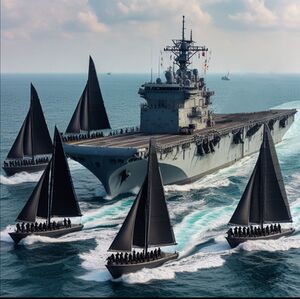
Littoral Operations Force (Burg: Force d’operations littorales (FOL)), colloquially known as the seahorses, is the is the Navy of Burgundie's primary special operations cavalry and a component of the Naval Special Warfare Command. Their mission is to secretly infiltrate and exfiltrate GGNCs on Special Operations missions worldwide. These missions include direct action on land, sea, coastline or rivers (such as strikes, captures, and ship takedowns by Visit, Board, Search, and Seizure), special reconnaissance, coastal patrol, and interdiction of suspect ships and surface craft, counter-terrorism operations, riverine warfare, deception operations, search and rescue operations, and foreign internal defense missions. Although FOLs and GGNCs undergo different training programs, both are focused on special operations in maritime environments. The FOL program includes extensive training on craft and weapons tactics, techniques, and procedures. Like GGNCs, FOLs must show physical fitness, possess strong motivation, be combat-focused, and maintain responsiveness in high-stress situations. They are broken into three ship-type operator classes:
- Watercraft Operators, motorized: used for typical surface insertion, extraction, and large-caliber direct fire support
- Watercraft Operators, sail: These watercrafts are used for stealth insertions. They have a battery bank and an electric motor, but to maintain maximum stealth, they are equipped with a collapsing mast, mainsail, and jib for a final, silent approach. The boats are made from maritime plywood, covered in carbon fiber to be undetectable on military coastal radar. They have one bow-mounted 6.9 mm LMG and a pintle point for the GGNC squad's machine gunner to attach their LMG at the stern.
- Aircraft Operators, rotary wing: used to carry and provide large-caliber direct fire support to GGNC teams via the NHIndustries NH90.
Autonomous First Strike Operations Group
The Autonomous First Strike Operations Group (Burg: Groupe d'operacions de primièra ataca autonòma (GOPAA)) is an independent unit of Special Warfare Command. AFSOG's mandate is to conduct preemptive strikes against high-value targets that pose an imminent threat to Burgundie's national security, typically in preparation of a larger military action, like an invasion, or to guarantee a diplomatic outcome. These operations often occur in the liminal spaces of international conflict, where conventional military deployment is deemed unsuitable or politically perilous. The group's autonomous nature allows it to act decisively and discreetly, minimizing the risk of escalation or diplomatic fallout. They are deployed with the Rapid Deployment Groups and there are plans to create AFSOGs for each theater. The group's creation addresses a more recent phenomenon, born out of the geopolitical realities of the 21st century. The rise of non-state actors, the proliferation of advanced weaponry, and the increasing volatility of the international arena have necessitated the development of new and innovative approaches to national security. AFSOG represents Burgundie's answer to these challenges in the global littoral, providing a flexible and potent tool for addressing threats that defy conventional solutions. They often work in conjunction with other Special Warfare Command units as well as the Central Unit and provide bridging capabilities between these two elements.
Robotic Scout Force
The Robotic Scout Force (Burg: Forse della Escoutes Robotiques (FER)) embodying the nation's embrace of technological innovation and its strategic vision to maintain its place at the forefront of global politics in an increasingly complex geopolitical landscape, as outlined in the 21st Century Burgoignesc Power Projection Stratagem, FER's mission is to act as a vanguard, infiltrating and disrupting hostile territory in preparation for amphibious assaults. Their modus operandi emphasizes stealth and precision, leveraging a diverse array of unmanned platforms to achieve their objectives without detection. These platforms include:
- Unmanned Aerial Vehicles (UAVs) employed for wide-area surveillance, target identification, real-time intelligence gathering, and, in limited cases, payload delivery;
- Unmanned Ground Vehicles (UGVs) employed for deploying sensor networks, disrupting communication lines, minelaying, and placing explosive charges on key infrastructure;
- Unmanned Surface Vehicles (USVs) employed for reconnaissance, deploying mines, and harassing enemy naval assets; and
- Unmanned Underwater Vehicles (UUVs) employed to gather hydrographic data, map underwater obstacles, lay mines, and conduct covert reconnaissance in harbors and other maritime chokepoints.
The FER's operational doctrine centers on the concept of "preemptive disruption," effectively crippling an adversary's ability to mount a coordinated defense, paving the way for successful amphibious landings. The FER's strategy aims to minimize casualties on both sides while maximizing the effectiveness of Burgundie's military operations. The FER personnel are drawn from the top echelons of Burgundie's naval forces and private sector. They undergo a demanding training regimen that encompasses not only technical proficiency in operating robotic systems but also advanced tactical and strategic thinking. They are adept at interpreting intelligence data, adapting to dynamic situations, and making critical decisions under pressure even outside of the structure of the military hierarchy.
Personnel
Bases
To be rebuilt, but expect them everywhere, like ants.
Equipment
The Navy of Burgundie uses a vertiable array of equipment to accomplish its various missions. Being the second eldest branch of the Burgoignesc Security Forces it also maintains stores of historic equipment for parades, memorials, commemorations, demonstrations, training, and as museum pieces. The modern aestheic of the modern Burgoignesc sailor is considerably dated compared to his/her counterparts but the equipment they use and sail on is some the most advanced in the world. The materiel and vehicles used by the Navy are exemplary of its mission, "maintain, train and equip combat-ready Naval forces capable of winning wars, deterring aggression, and maintaining the freedom and safety of the Burgoignesc littoral waterways and the international shipping lanes", in that the assumption is that the ships need to be able to accommodate forward deployed forces for long periods at all times. When not at war, readiness is assured through the constant participation in humanitarian missions and military exercises leading to the fleets of Burgundie having larger contingent of supply and sustainment vessels compared to any other navy its size. This make up also supports Burgundie's participation in the Levantine Union Defense Council, where it plays a crucial role in combat support and logistics. Unlike other neighbors, specifically Urcea, it does not have a massive aircraft carrier contingent, sporting only one mid-size carrier per fleet. Naval aviation is typically designation as a defensive measure and it achieves Command of the sea in the Metaorizonal Age through a sharing of resources with other Levantine Union Defense Council partners.
Marine infantry are equipped quite differently from their purely naval brethren. Their uniforms both combat and parade resemble those of the Army of Burgundie but they retain their naval heritage in their insignia. Having been mostly supplanted in their mission by the Burgoignesc Foreign Legion the Marine infantry are a relatively small unit of 46,490 personnel, tasked primarily with base security, maritime law enforcement duties, and humanitarian aid protection and distribution.
Vessel overview
| Ship type | Total number in posession | Number on active duty | Number in reserve | Number under construction | Notes |
|---|---|---|---|---|---|
| Aircraft Carrier | 21+17† | 12+17† | 7 | 2 | †Certain coastal Naval air stations are considered "aircraft carriers" but are rostered separately because they aren't actually. |
| Major Surface Combatants | 214 | 126 | 83 | 5 | |
| Patrol Vessels | 118 | 60 | 42 | 16 | |
| Unmanned surface vehicle | |||||
| Unmanned underwater vehicle | |||||
| Amphibious Warfare Ships | 75 | 44 | 30 | 1 | |
| Support Ships | 248 | 140 | 94 | 14 | |
| TOTALS | 748 | 424 | 284 | 40 |
Aircraft carriers
An aircraft carrier is classified in the Navy of Burgundie as a purpose-built vessel whose primary function is to launch and retrieve airframes in the maritime environment. The sub-role delineated for aircraft carriers by the Navy is a light aircraft carrier. A light carrier is classified as any aircraft carrier that displaces less than 16,000 metric tons, unloaded.
Status guide: ● active duty, not deployed; ○ active, duty deployed; ◎ active duty damaged/under repair; ★ ready reserve fleet; ☆ laid up in ordinary; ◆ withdrawn, exportable ◇ withdrawn, on loan; ▶ under construction; ▷ ordered; ◀ on sea trials
| Class | Picture | Ships in Class | Role/Type | Notes |
|---|---|---|---|---|
| Italian aircraft carrier Cavour | 
|
8 | Aircraft carrier
|
|
| Sea Control Ship | 
|
8 | Light aircraft carrier | |
| Stone carriers Seperately Rostered | ||||
| Stone carriers | 
|
17 | Naval air station | †Certain coastal Naval air stations are considered "aircraft carriers" but are rostered separately because they aren't actually. |
| TOTALS | ||||
| Rostered: 17+17† | Active: 8+17† | In Reserve: 7 | Under construction: 2 | |
Major Surface Combatants
Major surface combatants include destroyers, frigates, corvettes, and monitors and are classified as such because they are purpose-built vessels designed to wage war above the waves in combined fleet operations.
Status guide: ● active duty, not deployed; ○ active, duty deployed; ◎ active duty damaged/under repair; ★ ready reserve fleet; ☆ laid up in ordinary; ◆ withdrawn, exportable ◇ withdrawn, on loan; ▶ under construction; ▷ ordered; ◀ on sea trials
| Class | Picture | Ships in Class | Role/Type | Notes | |||||
|---|---|---|---|---|---|---|---|---|---|
| Helicopter destroyerss Burg: Contre-torpilleur porte-helicopteres | |||||||||
| Zaoka Class destroyer | 
|
8
|
Helicopter destroyers | In service 2015–present | |||||
| Destroyers Burg: Contre-torpilleur | |||||||||
24
|
Destroyer | ||||||||
| Frigates Burg: Fregate | |||||||||
| Frégate de défense et d'intervention | 
|
22
|
General purpose frigate | In service 2024-present | |||||
| Floréal-class frigate | 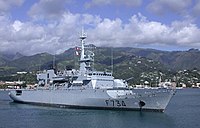
|
5
|
General purpose frigate
In service 1992- present | ||||||
| FREMM multipurpose frigate ASW | 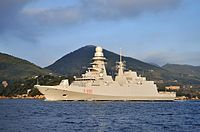
|
38
|
Anti-submarine frigates | ||||||
| FREMM multipurpose frigate AAW | 
|
38
|
Anti-air frigates | ||||||
| Constellation class frigate | 
|
37
|
guided-missile frigate | In service 2027-present | Corvette Burg: Corvette | ||||
| Hydra class | 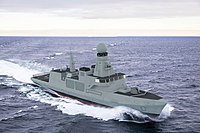
|
14
|
Corvette | In service 2025-present | |||||
| Monitor Burg: Obusiervaissel (howitzer ship) | |||||||||
| Thumper Class Littoral Monitor | 
|
4
|
Monitor | *155mm MONARC howitzer x1 | |||||
| Dominus Class Ocean-Going Monitor | 
|
3 active | Monitor | *12-inch/50-caliber Mark 8 gun x4 | |||||
| Obliterator Class Ocean-Going Monitor | 
|
3 active | Monitor | *380 mm/45 Modèle 1935 gun x1 | |||||
| Terminator Class Autonomous Ocean-Going Monitor | 
|
3 active | USV Monitor | *380 mm/45 Modèle 1935 gun x1 | |||||
| TOTALS | |||||||||
Rostered: 214
|
|||||||||
Patrol Vessels
Patrol vessels include avisos, offshore patrol vessels (OPVs), inshore patrol vessels (IPVs), icebreakers and are classified as such because they are purpose-built vessels designed to perform surveillance, search and rescue, EEZ sovereignty patrol, and packet functions, not as part of combined fleet operations. OPVs and IPVs are based out of a specific naval base and perform their roles from that point of origin. Avisos are not assigned to any one particular base and run missions and ultra-long-range patrols between bases, as determined by the Admiralty.
Status guide: ● active duty, not deployed; ○ active, duty deployed; ◎ active duty damaged/under repair; ★ ready reserve fleet; ☆ laid up in ordinary; ◆ withdrawn, exportable ◇ withdrawn, on loan; ▶ under construction; ▷ ordered; ◀ on sea trials
Mine Warfare Ships
Mine warfare ships include any ships assigned as a danlayer, minesweeper, mine countermeasures vessel, mine planter, minehunter, or a minelayer.
Status guide: ● active duty, not deployed; ○ active, duty deployed; ◎ active duty damaged/under repair; ★ ready reserve fleet; ☆ laid up in ordinary; ◆ withdrawn, exportable ◇ withdrawn, on loan; ▶ under construction; ▷ ordered; ◀ on sea trials
| Class | Picture | Ships in Class | Role/Type | Notes |
|---|---|---|---|---|
| Tripartite-class minehunter | 
|
10
|
Minehunter | |
| City-class mine countermeasures vessel | 
|
8
○ VNB Capetaine Lluc-Ache Marrion Bell (GT Gemini/LoNSC Standing Mine Countermeasures Task Group 1)
|
Mine countermeasures vessel | |
| TOTALS | ||||
Rostered: X/18
|
||||
Amphibious Warfare Ships
Status guide: ● active duty, not deployed; ○ active, duty deployed; ◎ active duty damaged/under repair; ★ ready reserve fleet; ☆ laid up in ordinary; ◆ withdrawn, exportable ◇ withdrawn, on loan; ▶ under construction; ▷ ordered; ◀ on sea trials
| Class | Picture | Ships in Class | Role/Type | Notes |
|---|---|---|---|---|
| Mistral-class amphibious assault ship | 
|
8 | Amphibious assault ship | |
| Foudre-class landing platform dock | 
|
5 | Amphibious transport dock | |
| Enforcer class landing platform dock | 
|
5 | Landing platform dock | |
| USS Lewis B. Puller (ESB-3) | 
|
18 (3 active, 1 reserve, 14 under construction/on order) | Expeditionary Mobile Base | |
| TOTALS | ||||
Rostered:36/36
|
||||
Support Ships
Status guide: ● active duty, not deployed; ○ active, duty deployed; ◎ active duty damaged/under repair; ★ ready reserve fleet; ☆ laid up in ordinary; ◆ withdrawn, exportable ◇ withdrawn, on loan; ▶ under construction; ▷ ordered; ◀ on sea trials
Miscellaneous Non-combatants
Status guide: ● active duty, not deployed; ○ active, duty deployed; ◎ active duty damaged/under repair; ★ ready reserve fleet; ☆ laid up in ordinary; ◆ withdrawn, exportable ◇ withdrawn, on loan; ▶ under construction; ▷ ordered; ◀ on sea trials
| Class | Picture | Ships in Class | Role/Type | Notes |
|---|---|---|---|---|
| Landing craft Burg: Llanxes de desembarcament | ||||
| BATRAL-class landing ship | 
|
TBD | Light ferry ship | |
| Engin de débarquement amphibie rapide | 
|
TBD | roll-on/roll-off catamaran landing craft (L-CAT) | |
| TBD | Survey ship | |||
| TBD | Survey ship | |||
| TOTALS | ||||
Rostered: X/X
|
||||
Aircraft
Status guide: ● active duty, not deployed; ○ active, duty deployed; ◎ active duty damaged/under repair; ★ ready reserve fleet; ☆ laid up in ordinary; ◆ withdrawn, exportable ◇ withdrawn, on loan; ▶ under construction; ▷ ordered; ◀ in flight trials
| Designation | Picture | Number of aircraft | Role/Type | Notes |
|---|---|---|---|---|
| Fighter Burg: Guerreuer | ||||
| G-56 Pugilist Aeronautique | 
|
75 | Multirole combat aircraft | |
| Rafale M | 
|
137 | Multirole combat aircraft | |
| Helicopter Burg: Giravions | ||||
| NHIndustries NH90 | 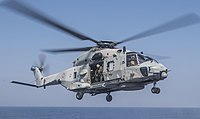
|
47 | Medium Utility helicopter, ASW / SAR | |
| Airbus H160M Guépard | 
|
49 | ASuW / SAR | |
| AgustaWestland_AW139 | 
|
18 | Medium Utility helicopter / SAR | |
| Eurocopter AS565 Panther | 
|
22 | Utility | |
| Eurocopter AS365 Dauphin | 
|
22 | Utility | |
| AWACS | ||||
| Northrop Grumman E-2 Hawkeye | 
|
8 | AEW&C | |
| Maritime patrol | ||||
| Bréguet 1150 Atlantic | 
|
22 | ASW / Patrol | |
| Dassault Falcon 2000 Albatros | 
|
46 | Maritime surveillance and intervention | |
| Transport | ||||
| AAM C-121 | 
|
22 | Transport | |
| AAM C-390 | 
|
14 | Transport | |
| Dassault Falcon 10 | 
|
8 | Transport | |
| TOTALS | ||||
Rostered: 476
|
||||
Firearms
The Burgoignesc Naval Jack is a burgundy field with the Burgundian Cross in canton. This design was adopted as the flag in 1821 after it was flown over the successful Closing of the Channel during the First Fratricide.
In accordance with Burgoignesc Flag Code it is flown at altitudo luminare (Eng. lesser altitude) than the Burgoignesc Flag, but has the honor of being granted altitudo idem (Eng. same height) status as the royal flag and superioritatem (Eng. superiority) over all other flags in Burgundie, including the flags of the other military branches.
Previous to the adoption of the current naval jack there was not a singular flag for the Navy of Burgundie.
